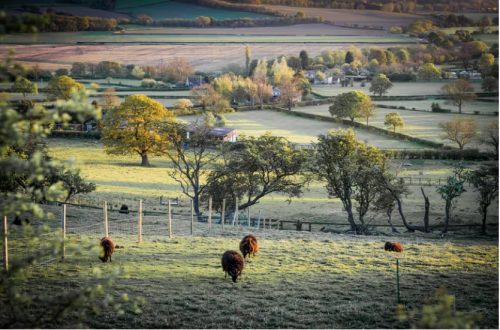Sir Nicholas Stern’s report on the potentially grave environmental and economic effects of climate change made worldwide headlines when it was released. But already, just over a week later, it has slipped off the political radar. The news agenda has moved on – and with it manifest public concerns. Even last week’s widely publicised climate change demo had a less than stunning turnout.
Sir Nicholas outlined ways we can avert possible climate disaster and warned that we need to spend now on prevention, in order to save having to spend much more in the future to deal with the runaway effects of eco-meltdown.
One of the more graphic summaries of the possible long-term effects of global warming was written by Peter Tatchell earlier this week in the Comment is Free section of The Guardian.
Many of his likely future scenarios are what I would call “rational speculation” – calculated projections from known facts and existing warning signs.
Of particular concern, is his suggestion that climate chaos could cause mass flooding, hundreds of millions of refugees, big drops in food production, mass hunger and unemployment, wars for control of diminishing food stocks and fresh water supplies, and the rise of new totalitarian movements to “restore order.”
Tatchell has been outlining these future scenarios for two decades. Many of his critics have accused him being “alarmist” and a “doom-sayer”. May be. I am not qualified to know whether he is over-egging what might happen 80 or more years down the line. But it sounds plausible – and worrisome.
Like Sir Nicholas Stern, Tatchell stresses that potentially devastating ecological consequences are not inevitable. They can be averted by concerted action now, including technological innovation to produce so-called green fuels and greater energy-efficiency.
It strikes me that what is needed (among other things) is the modern equivalent of a Manhattan Project, bringing together the best of the world’s scientists, and giving them large-scale funding, to come up with technological solutions to the dangers posed by global warming. What I particularly appreciate about Tatchell’s approach in this respect is that it assumes that human kind has the knowledge and technology to confront the problem. This isn’t a “let’s all get back to nature and wear an itchy shirt” position.
Anyway, here’s an excerpt from Tatchell’s article, which gives a flavour of the potential consequences of unchecked global warming:
Only 20,000 people joined Saturday’s London rally calling for urgent international action to halt global warming. Given the potential threat posed to life on earth by climate change, there should have been a million of us. But it seems that without dead bodies in the street and mass blackouts, most people cannot get agitated about impending economic and environmental meltdown.
The me-first, live-for-today, hedonistic, consumerist mentality foisted on much of the world by free market capitalism has blunted many peoples ability to feel concerned about next year, never mind the state of the planet two decades from now.
With good reason, millions of people marched against the Iraq war. I was one of them. But the human and ecological devastation of unchecked climate change is likely to be a thousand times worse than the horrors of Iraq – and global.
By 2080, England may no longer be a green and pleasant land. Instead, we’ll probably be living in a brown, sunburnt country more like Australia.
In between periods of prolonged scorching drought there will probably be unpredictable semi-tropical downpours and flash floods wrecking havoc over huge swathes of the country. Many of our major cities could be periodically waste-deep in storm water. Rising sea levels and tidal surges could turn streets into canals; with much of low-lying London becoming a British version of Venice, but without the bridges and gondoliers. The Thames Barrier will offer no protection. It, too, will be swamped.
This is what life might be like less than eight decades from now unless global warming is halted. And these devastating effects are just phase one of the consequences of global warming. Phase two – sometime in the twenty-second century – is likely to be even nastier, and more surprising: a Siberian-style ice age blanketing Britain and all of Europe for most of the year, with blizzards so strong and temperatures so low that food production will almost cease and our economies will be just a shadow of what they are today. In short, the world could become a Hobbesian nightmare, where life is nasty, brutish and short.
Already, we’ve had a foretaste of this dystopian future, with thousands of people dying in Europe during recent heat waves, and hundreds of thousands more being flooded out by flash storms.
Most climate scientists now predict a two to five degree increase in average global temperatures by 2100. This will accelerate the already discernable melting of snow fields, glaciers and the polar ice caps, precipitating a one to three metre rise in sea levels during the second half of this century (some scientists fear an eventual five metre rise in ocean levels).
The effects on the UK will be devastating. By around 2080, many low-lying coastal and river estuary regions are likely to disappear forever under the rising oceans. The size and shape of the UK landmass will shrink permanently. Other ‘surviving’ parts of the country will become prone to regular, large-scale flooding; either by tropical-style storms or massive tidal surges.
Researchers at the government’s Office of Science and Technology have calculated that changing weather patterns in Britain over the next two decades are likely to produce catastrophic mega floods every 10 years. In between, lower-level floods will become routine – causing around £20 billion damage annually. Even these lower-level floods will have a very significant impact on government finances and spending – and on the economy. But the mega floods that are predicted once every decade look set to cause a financial and economic impact equivalent to a major war.
I would recommend people reading the whole article.
It strikes me that this is one area in which pessimism – even if over-egged – is prefereable to over-confidence and rose-coloured optimsim.


